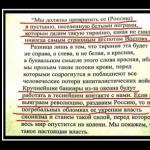Tax holidays for individual entrepreneurs in the regions. Tax holidays for individual entrepreneurs or who can apply a zero rate under the simplified tax system? Rate 0 for newly registered individual entrepreneurs
The Ministry of Finance clarified the conditions for applying the zero rate to individual entrepreneurs who switched to the “simplified system”
05.03.2018Which entrepreneurs have the right to apply a 0% single tax rate under the simplified tax system? As the Ministry of Finance of Russia writes and explains to us in its , the laws of the constituent entities of the Russian Federation may establish a tax rate of 0% for individual entrepreneurs who have chosen the object of taxation in the form of income or in the form of income reduced by the amount of expenses first registered after the entry into force of the specified laws and carrying out business activities in the production, social and (or) scientific spheres, as well as in the field of consumer services to the population. Reason: paragraph 4 of article 346.20 of the Tax Code of the Russian Federation.
Entrepreneurs have the right to apply a tax rate of 0 percent from the date of their state registration as an individual entrepreneur continuously for two tax periods.
Are there any restrictions on the application of the zero rate? Yes, there are such restrictions.
At the end of the tax period, the share of income from the sale of goods (work, services) when carrying out types of business activities for which a tax rate of 0% was applied in the total amount of income from the sale of goods (work, services) must be at least 70%.
If for some reason this condition is not met, then the individual entrepreneur does not have the right to apply a tax rate of 0% for a given tax period. He loses the right to apply such a tax rate in the second tax period.
What can be concluded? If in the first year the entrepreneur lost his right to apply the zero rate, then in the second year this right no longer applies. In other words, you cannot “correct” the situation in the second year and “restore” your right to a zero rate.
What types of activities can an individual entrepreneur choose to work at zero pay?
To apply the 0% rate, an entrepreneur must work in the following areas:
Production,
Social,
Scientific.
But, as noted in Article 346.20 of the Tax Code of the Russian Federation, types of entrepreneurial activities in the production, social and scientific spheres, in respect of which a tax rate of 0% is established, are established by the constituent entities of the Russian Federation on the basis of the All-Russian Classifier of Types of Economic Activities.
What additional restrictions may be imposed?
Let us turn a second time to the provisions of Article 346.20 of the Tax Code of the Russian Federation, which says that the laws of the constituent entities of the Russian Federation may establish additional restrictions on the use of zero-rate individual entrepreneurs:
Limitations on the average number of employees;
Limitations on the maximum amount of income from sales received by an entrepreneur when carrying out a type of business activity in respect of which a zero rate is applied. At the same time, the maximum amount of income provided for in paragraph 4 of Article 346.13 of the Tax Code of the Russian Federation for the purpose of applying the simplified tax system can be reduced by the law of the subject of the Russian Federation by no more than 10 times.
“Holidays” is a good word, but “tax holidays” is even better. This word promises a period free from study or activity, and in relation to businessmen - temporary relief from the tax burden. But vacations, in their classical sense, are given to those who are already tired of studying or righteous labors, and tax holidays are provided to newcomers who have just passed state registration.
Tax holidays were discussed quite widely; they were also mentioned by the President in. Expectations from their introduction were serious, so we even advised our users to postpone state registration of LLCs and individual entrepreneurs until we received clarity on this issue.
Who can get tax holidays?
However, the much-awaited law did not become a New Year's gift to potential businessmen. Firstly, it turned out that tax holidays were provided only for newly registered individual entrepreneurs, and for LLCs they were not introduced for a reason that was surprising for business, but completely understandable for bureaucrats. Officials simply have not found mechanisms to prevent the mass registration of new companies with the goal of zero taxation.
Registration of individual entrepreneurs is carried out using the individual’s tax identification number, which does not change throughout his life, so it is easy to track those who de-registered and registered again in order to be subject to tax holidays. But closing an existing company and opening a new one, which will be subject to tax holidays, is simple, because the TIN of organizations is different. Thoughts were expressed to link the possibility of registering one “preferential company” to specific founders, but they did not have time or did not want to develop the corresponding mechanism.
So, we repeat, tax holidays are only available for newly registered individual entrepreneurs. Tax holidays do not apply to entrepreneurs already operating at the time the regional law comes into force.
Secondly, the federal law did not introduce tax holidays throughout the Russian Federation, but only gave the regions the right to introduce them. The regions were in no hurry to do this, so as not to lose the expected tax revenues from new individual entrepreneurs. The estimated “shortage” of taxes due to the proposed benefits for Russia as a whole is 250 billion rubles. There is not so much within the state budget, but for some regional budgets even 1-2 billion rubles is a serious amount. Although, it would seem, what difference does it make - after all, tax holidays do not reduce existing tax revenues, but give residents of the regions the opportunity to open new businesses, get on their feet and then replenish the treasury. But still, a significant part of the regions have introduced zero taxation on their territory for new entrepreneurs.
Thirdly, tax holidays apply to certain types of activities in production, services and scientific activities. Trade is not subject to tax holidays! Each region sets for itself specific types of activities indicating the OKVED code to which this benefit will apply. In addition, local laws may establish other restrictions and requirements for individual entrepreneurs “on vacation.”
Fourthly, tax holidays can only be received by individual entrepreneurs who have chosen the simplified tax system and the special tax system. This benefit does not apply to the imputed regime and OSNO.
Fifthly, although the validity of regional laws on tax holidays is set until the end of 2020, a specific individual entrepreneur can receive them for a maximum of 2 years (the law refers to this as a tax period). Regarding the tax period, you also need to know the following: it also includes the year in which the individual entrepreneur was registered. For example, the law on tax holidays in the Krasnodar Territory came into force on May 8, 2015, which means an entrepreneur who registered after this date can work at a zero rate until the end of this year plus the next year, that is, less than two years.
In total, only individual entrepreneurs who comply with the following requirements can receive a zero tax rate for a period of up to two years:
- those who first passed state registration as an individual entrepreneur after the entry into force of the regional law on tax holidays;
- intending to carry out activities from the list given in the regional law;
- those who have chosen the tax regime of the simplified tax system or PSN and switched to a zero rate immediately after registration.
For the convenience of paying taxes and insurance premiums, we recommend opening a current account. Moreover, now many banks offer favorable conditions for opening and maintaining a current account.
What other requirements must individual entrepreneurs operating under tax holidays fulfill?
This list of requirements for beneficiaries is not exhausted; individual entrepreneurs “on vacation” will be monitored, and in case of violations, they will be deprived of the opportunity to use this benefit.
The share of income received by individual entrepreneurs from activities for which tax holidays have been introduced must be at least 70% of all income. If an entrepreneur combined “preferential” types of activities with others, for example, production and trade, and received less than 70% of income from the preferential type of activity, then all his income will be taxed at the regular rate of 6%. An individual entrepreneur who has issued different patents for different types of activities, including those that are not included in the regional law, will have to keep separate records of income.
Local laws on tax holidays may set their own income limits for those working on the simplified tax system. So, in 2018, the limit for simplifiers was set, in general, at 150 million rubles. Regions can reduce this limit, but no more than 10 times. There are also restrictions regarding hired workers. Moscow entrepreneurs, for example, will be able to hire no more than 15 people, not only on the PSN, but also on the simplified tax system (as a general rule, you can have up to 100 employees on the simplified system).
Individual entrepreneurs operating under the tax holiday regime do not have any benefits when paying insurance premiums for themselves and for their employees. An entrepreneur’s contributions for himself in 2018 are at least 32,385 rubles, and they must be transferred even if there is no income from the business.
The base of regional laws on the introduction of a zero tax rate for new individual entrepreneurs is often updated, in addition, each of them has its own validity period. Current texts can be found on the Ministry of Finance website or in legal reference systems. In addition, you can find out all the details about the zero rate from the Federal Tax Service at your place of registration.
Expert opinion
Andrey Leroux
More than 15 years of experience Specialization: contract law, criminal law, general theory of law, banking law, civil procedure
Tax holidays are a legislatively defined method of stimulating small businesses, which began to operate in 2015 in pursuance of Federal Law No. 477 “On Amendments and Additions to the Tax Code of the Russian Federation” dated December 16, 2014.
Measures to reduce the tax burden may include:
- exemption from income tax;
- reduction of rates for certain types of taxation within a specified period;
- a combination of exemptions and rate reductions at certain intervals.
The effective date for tax holidays is set at the regional level. For example, in 2015 they were introduced in the Moscow and Pskov regions, in 2016 - in the Perm region, in 2017 - in the Bryansk region and the Kabardino-Balkarian Republic. In total, starting from 2015, tax holidays were introduced in 81 regions. In 2019, it is planned to introduce holidays in the Republic of Crimea, Tatarstan and Sevastopol.
Subjects of the Russian Federation received the right to establish tax holidays for individual entrepreneurs in the form of a tax rate of 0%. This benefit will be provided during 2015-2020 on the following conditions:
1) Only first-time registered individual entrepreneurs can apply tax holidays. That is, if you are already an existing individual entrepreneur, deregister with the tax authorities and register as an individual entrepreneur again, you still do not have the right to apply a preferential rate.
Individual entrepreneurs who have switched to the simplified tax system or patent within 2 years from the date of registration can also be used.
2) Activities should be carried out in the production, social and scientific spheres. The share of income in such types of activities must be at least 70% of total income.
4) The right to tax holidays (0% rate) is granted only for the first 2 years of activity.
5) Subjects of the Russian Federation, at their own discretion, may introduce additional restrictions, for example, limiting the maximum amount of income from sales and limiting the average number of employees.
For persons on a patent (PSN)
An important point: self-employed citizens were allowed to use the patent tax system. That is, an individual who does not have employees can work on a patent without registering an individual entrepreneur with the tax office. This category of taxpayers can obtain a patent in a simplified manner.
Self-employed citizens can apply for a patent, which will be valid from the beginning of the next year, no earlier than December 1 of the previous calendar year.
In general, the PSN has increased the tax payment deadline for all taxpayers:
- If the patent was received for a period of up to 6 months, then the tax will need to be paid in full no later than the expiration of the patent, while currently the tax is paid no later than 25 days after the patent begins to be valid.
- If the patent is received for a period of 6 to 12 months, then 1/3 of the tax amount will need to be paid 90 days after the patent begins to be valid, whereas now this period is 25 days.
- The remaining 2/3 of the tax amount must be paid no later than the expiration of the patent (usually this period is no later than 30 days before the expiration of the patent).
Benefits for small businesses
According to government order No. 98-r dated January 27, 2015, a number of measures are provided to support small and medium-sized businesses, namely:
1) For the simplified tax system: granting the right to constituent entities of the Russian Federation to reduce the tax rate from 6% to 1% for taxpayers of the simplified tax system “income”.
2) For PSN: the list of permitted activities on PSN has been expanded.
3) For PSN: granting the right to constituent entities of the Russian Federation to reduce the maximum amount of potential annual income that an individual entrepreneur can receive in the course of its activities (from 1 million rubles to 500,000 rubles)
4) For UTII: granting the right to constituent entities of the Russian Federation to reduce the tax rate from 15% to 7.5%
5) Increasing by 2 times the maximum values of revenue from the sale of goods and services for classifying business entities as small and medium-sized businesses:
For micro-enterprises – from 60 to 12 million rubles
For small enterprises - from 400 to 800 million rubles
For medium-sized enterprises – from 1 to 2 billion rubles.
The Ministry of Finance, represented by the Department of Tax and Customs Policy, is concerned with some of the nuances of applying the zero rate for individual entrepreneurs in the patent taxation system. All the nuances were described in the letter of the Ministry of Finance dated October 17, 2016 N 03-11-09/60291. Let's try to translate the dry language of an official into a language understandable to an individual entrepreneur. The letter focuses on several points that could dilute the joy of introducing preferential taxation for entrepreneurs in the patent system.
As is known, for individual entrepreneurs who are under the patent taxation system and first registered after 01/01/2015, a tax rate of 0 percent can be set continuously, but not more than two tax periods within two calendar years.
In reality, it is not uncommon for an entrepreneur to change the taxation system for some reason during the tax period, for example, due to the expiration of a patent. So, for example, an individual entrepreneur was first registered as an individual entrepreneur on April 15, 2015 and from this date until December 15, 2015, applied a rate of 0 percent. For the period from December 16 to December 31, 2015, if the individual entrepreneur has not ceased business activities, he is obliged to calculate taxes in accordance with the OSNO (STS). Let’s say that an entrepreneur acquired a new patent and, from February 7, 2016, switched from the general regime (STS) to the patent taxation system, then he does not have the right to apply a tax rate of 0%, since he violated the principle continuity application of PSN during two tax periods. This principle of continuity must also be taken into account by entrepreneurs who are switching from a general or simplified taxation system to a patent one.
What should entrepreneurs who combine the simplified tax system and the patent system do? For such persons, the constituent entities of the Russian Federation received the right to introduce a tax rate of 0 percent in relation to business activities in the production, social and scientific spheres - from January 1, 2015, in the field of consumer services to the population - from January 1, 2016. And again a fly in the ointment from officials. If an individual was first registered as an individual entrepreneur in 2015 and applies a patent taxation system in relation to household services to the population, for which a tax rate of 0 percent was introduced from January 1, 2016, this taxpayer cannot apply a tax rate of 0% in relation to household services to the population. Individual entrepreneurs first registered on January 1, 2016 have this right in relation to business activities in the provision of household services to the population.
How effective are these benefits? Have you encountered such situations?
Natalya Kostina,Accounting company ""
Tax holidays have appeared in our country since 2015.
Their goal was to encourage entrepreneurs to open their own businesses in difficult times of crisis and to bring illegal businessmen out of the shadows.
But this benefit has its own criteria. Who can count on tax holidays, and do they apply to all areas of business?
Definition of concepts. Legislative regulation of the issue
Tax holidays appeared on January 1, 2015. At the legislative level, this concept was enshrined in Federal Law N 477-FZ. Tax holidays are a period of benefit for entrepreneurs, during which they are exempt from paying taxes.
This system has its advantages and disadvantages.
On the positive side Tax benefits include the following:

Among shortcomings The following programs can be distinguished:
- Restrictions on the categories of entrepreneurs and activities that are eligible to receive tax benefits. For example, businessmen engaged in trade cannot count on benefits.
- Local authorities regulate the provisions for the provision of benefits and prescribe the conditions for compliance.
- The validity period is two calendar years, but in the end it turns out that the entrepreneur enjoys benefits for a shorter period of time.
What areas of business activity does the benefit apply to?
Activities that are eligible for zero tax are strictly regulated by law.
It can be spheres:
- scientific;
- social;
- production.
Which small business entrepreneurs can take advantage of tax deferment?
Tax holidays are granted only to those entrepreneurs who are registered for the first time.
Each registration of an individual entrepreneur is carried out in connection with the businessman’s tax identification number. It is thanks to this that the tax service can easily track whether a person previously had an individual entrepreneur or not. Therefore, an attempt to close the old case and open a new one in order to receive benefits will not succeed.
the federal law did not provide holidays mandatory for all regions. Each subject is given the right to introduce the system on time at its own discretion.
In addition, entrepreneurs who are engaged in trade. For other types of activities, each region compiles its own list.
In order to qualify for tax holidays, the entrepreneur is obliged comply with the following conditions:
- The profit percentage must be at least 70% of income.
- Limits have been established for individual entrepreneurs operating under a simplified system.
- There are restrictions on the number of hired workers.
Which tax regimes are subject to zero tax?
Tax holidays can be applied to businessmen who work as under simplified and patent taxation system.
To apply for a benefit, a businessman, when registering with the tax office, must, on the day of registration apply for a patent. If an entrepreneur decides to work under a simplified system, he is obliged to notify the control authorities about this within a month from the date of registration.
If an individual entrepreneur works under UTII or OSNO, it will not be possible to receive benefits. 
Validity
Tax holidays have been introduced until 2020.
They spread their action in the first two years of work entrepreneurs. The tax period is established in accordance with the Tax Code of the Russian Federation. This means that if an entrepreneur registered in November, then his calendar year will still end on December 31st. Therefore, it is best to start a business at the beginning of the year. This will make it possible to enjoy benefits for much longer.
For entrepreneurs who work according to patent tax system, the benefit is valid for two calendar years. The tax period in this case is the validity period of the patent. If it is less than a year, then the vacation period will end earlier than can be established. This type is unfavorable for patents with a short term.
What payments will you still have to pay?
During tax holidays, entrepreneur not exempt from all taxes. Individual entrepreneurs are not exempt from property duties and payments for each employee. Holidays do not apply to insurance premiums for employees and the entrepreneur himself.
Thus, during the tax holiday period, taxes on UTII, trade tax and property taxes on individuals and legal entities must be paid.
Regional features of provision
Tax holidays for entrepreneurs are in effect differently in different areas. One of the very first regions to adopt the law was the Penza region.
Penza region
If IP in the Penza region works simplified , then his activities should be related to:

At patent system Businessmen who provide repair services for shoes, radio equipment, and clothing will be able to take advantage of the benefit. Each subject establishes its own lists of activities. You can always obtain information about the complete list from the tax office.
Sverdlovsk region
In 2015 Sverdlovsk region joined the entities providing entrepreneurs with zero tax rates.
To this end, two laws were adopted at the local level. 31 types of activities are taxed under simplified taxation and 15 under patent taxation at a rate of 0%.
Moscow and St. Petersburg
IN Moscow The legislative act was adopted on March 25, 2015. To receive benefits, entrepreneurs must meet the following conditions:
- The number of employees should not exceed 15 people.
- Under the simplified system, tax holidays apply to entrepreneurs who work in the following areas: education, healthcare, scientific development, social services. The manufacturing sector includes all those involved in toys, clothing, food, appliances, medical supplies, machinery, and leather goods.
- For the patent taxation system, the following types of activities are distinguished: repairing, sewing and painting shoes, repairing leather, fur, repairing household appliances at home, childcare, translations, printing activities, excursions.
Tax benefits for individual entrepreneurs in the city St. Petersburg started operating in 2016. For entrepreneurs, there is a maximum revenue limit of 30 million rubles. For those who work under a simplified taxation system, benefits apply in the following areas:

For the patent system, the list of activities is the same as in Moscow, but the production of dairy products and bread baking is also added.
Stavropol region
Authorities Stavropol Territory do not establish additional requirements for entrepreneurs.
At the level of local legislation, a list of areas of activity was adopted for both the patent and simplified taxation systems. The services of cooks at home and sports training have been added to the patent IP.
Crimea
We will separately highlight tax benefits in the Republic of Crimea. To attract investors, the Republic practices two-year benefits on property, land and transport.
But this applies only to investors; tax holidays have not yet been introduced for individual entrepreneurs in Crimea.
Take advantage some tips to get the most out of the tax holiday:
- Entrepreneurs of both the patent and simplified taxation systems, engaged in activities in the domestic, social and scientific spheres, can take advantage of tax holidays. Please note the holiday period! They last for two years, according to the tax service. To get the maximum benefit, do not open a sole proprietorship at the end of the year.
- An entrepreneur can take advantage of tax holidays only once in his life. If he closes his individual entrepreneur and opens a new one in order to receive benefits, he will not succeed.
- Do not forget that an entrepreneur is not exempt from paying insurance premiums, property taxes and wages during the tax holiday.
- Despite the fact that under the simplified system you do not need to pay tax, the declaration must be submitted annually.
The rules for providing tax holidays for entrepreneurs are described in the following video:






